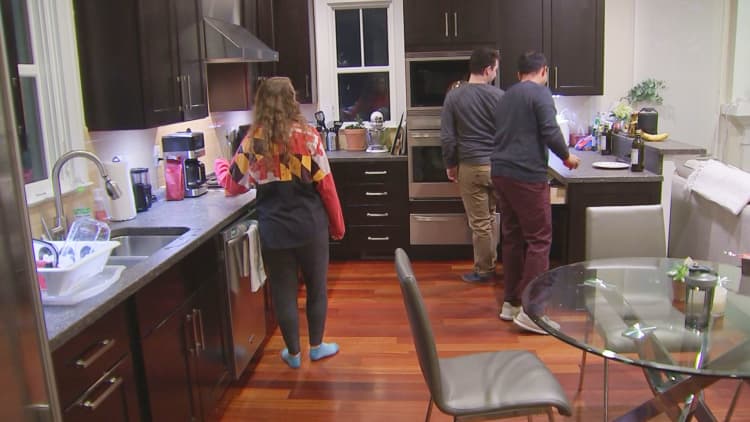
Alex Reading, 29, and Abhi Sanka, 25 were complete strangers when they each toured a five-bedroom home in Arlington, Virginia, a little over a year ago.
But they decided to move in together, along with three other complete strangers. All of them had answered ads to rent one room in the home and share the common spaces.
"It was perfect for me because I was just moving down here for grad school, and I didn't know anybody, so I was just looking for a room or a roommate so this was like a perfect situation," said Reading.
The ads were from Bungalow, a barely 3-year-old co-living company that rents private bedrooms in large suburban and urban homes. Tenants can use the common areas, which Bungalow furnishes — fully equipped kitchens, living rooms with sofas and flat-screen televisions, as well as dining tables and general decor.
The idea was the brainchild of Bungalow's 31-year-old co-founder and CEO, Andrew Collins, who had moved around a lot himself and had trouble finding optimal living spaces.
"It's not a boarding house," said Collins. "It's much more around helping people find great individuals to live with. We're really trying to streamline the roommate experience. What's better than having great individuals that you live with, and we take that one step further by running monthly member events across all the properties, too."
Bungalow takes care of the maintenance, cleaning, Wi-Fi, lawn care and utilities. Renters pay one monthly fee for all of that. The company also helps roommates prescreen each other by sending them to happy hour.
"I think when we go on those happy hours meeting new roommates I think we can sort of feel out like is this someone we feel comfortable with and that helps," Reading said.
"I think bungalow does a good job of building a community of like-minded people in the same sort of age range and experience," said Sanka.
Bungalow doesn't own the homes. It works with landlords. Each renter is on a separate contract with Bungalow, so if one person moves out, there is still rental income. All the rents added up are usually more than the house would get for a single tenant.
"We're able to capture 40-50% higher rents, and so what that allows us to do is then work with homeowners, so we can actually create a higher revenue stream for them," said Collins. "Also, because we're renting out individual bedrooms, we never have full vacancy, so we have on average a 98% ongoing occupancy across the portfolio."
Last fall. the company announced $47 million in new funding, bringing total funds to $68 million. Collins said he expects that will help them scale to more than 12,000 residents by the end of this year. Bungalow started in San Francisco in early 2017 and has expanded to 11 markets, including New York, Boston, Chicago and Seattle.
Other co-living companies like Common, Ollie, WeLive and Quarters use the same model of single rental contracts with shared common spaces, but most are in urban apartment buildings. Bungalow does offer some apartments but is focused more on the single-family home.
The number of co-living units has expanded dramatically in the last few years, with well over $2 billion in financing already in the new space as of the end of 2018, according to a study by Cushman & Wakefield in May.
"We're looking to solve housing affordability, and loneliness and community," said Collins. "In San Diego, we've seen them add 16,000 new jobs in the last year, but only enough housing for 3,000 additional people. Our intention here is to go global and to really build a network across each market that gives people not only an incredible housing experience, but also a great community."


